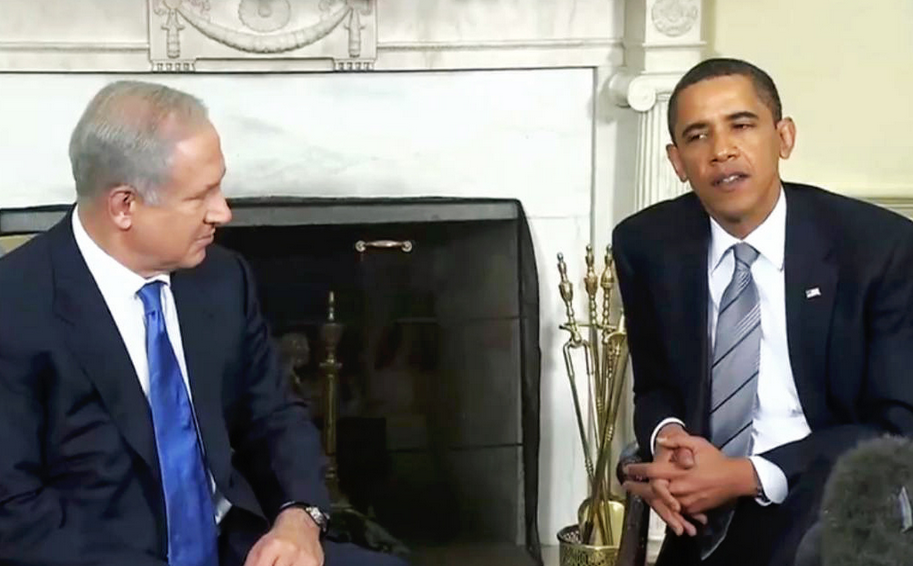As murmurs in Hebrew permeated the room and the predominantly sprightly, older crowd found their seats, it became quickly evident that this event would exude a vibrant energy. Hosted by the UCLA Nazarian Center for Israel Studies and entitled “Not So Special Relationship?: Israel-U.S. Relations During the Obama Administration,” the event promised an appealing forum to learn about the ever-evolving U.S.-Israel relationship.
Side conversations soon came to a halt and the eager crowd listened intently as the slightly-accented voice of Professor Ilai Saltzman of Claremont McKenna College welcomed them. Based on the title of the event, it appeared as though this introduction would mark the beginning of what was to be a barrage of attacks against President Barack Obama’s supposed distaste for Israel and its policies. After all, Obama is commonly cited by right wing proponents of Israel, like former U.S. ambassador to the U.N. John Bolton, as the most anti-Israel president in American history.
However, I was pleasantly surprised that the impression conveyed by the event’s title did not prove to be the salient tenor of the lecture. On the contrary, Professor Saltzman maintained a greater scholarly objectivity than anticipated. Although the main points of his argument did in fact communicate a right-wing persuasion, his responses to questions asked at the end of the lecture on policy decisions indicated a left-wing persuasion.
Before this paradoxical and somewhat contradictory reveal, Saltzman cited five specific foundations of the U.S. and Israel’s “special” and mutualistic relationship that has allowed for its strength and longevity: overlapping interests, the American pro-Israel lobby, common democratic values, a common ethos, and the Judeo-Christian tradition. Despite his premise that conflict between the U.S and Israel has in fact intensified under the Obama administration, he refrained from explicitly and exclusively incriminating Obama or his administration as the cause of this change.
Saltzman began his talk by contrasting the foreign policy interests of past American presidents with those of President Obama. He brought up Obama’s speech delivered at Cairo University in 2009, his “involvement with Islam,” and his past residence in Indonesia, in order to prove his point: Obama has been actively trying to lessen the “American footprint” in Israel. American involvement with Israel under Obama’s immediate predecessor George W. Bush, on the other hand, reached such a boiling point, said Saltzman, that American-Arab relations even hit a nadir.
Expanding on this point, Saltzman explained that Bush employed a “honey trap strategy,” whereby Bush first extended goodwill to Israel’s then-Prime Minister Ariel Sharon. Only then, after establishing a good relationship with Sharon, did Bush coerce him regarding policy decisions. Conversely, Saltzman continued, Obama has turned to a more direct and public method of pressuring the Israeli government to act in accordance with America’s interests. Moreover, Saltzman claimed that the rise of J-Street, the self-described “pro-Israel, pro-peace” advocacy organization, and the corresponding liberalization of the collective American Jewish perspective on Israel, has emboldened President Obama to be more critical of the Jewish state and its many contentious actions.
Lastly, Saltzman explained how Israel was formerly commonly seen as “David” and the unified Arab states as “Goliath,” but now Israel is seen as the oppressive “Goliath” and the Palestinians as the victimized “David.” According to Saltzman, this has caused many Americans, even many American Jews, to believe liberalism and Zionism to be mutually exclusive.
During the Q & A session, however, Saltzman pointed to Bush and his Secretary of State Condoleezza Rice as the reason for the rise of the terrorist group Hamas as the governing party of the Gaza Strip, explaining that Bush and Rice insisted on free elections in the Gaza Strip despite Sharon’s warnings of what could result. He also rejected a common conservative talking point that anti-Zionism is by nature anti-Semitism, and warned of the rise of right-wing MK Naftali Bennet, whose rhetoric and policy, Saltzman believes, will lead the two sides further from peace.
Though taken aback, I was also fascinated by Saltzman’s mixed perspective. While he implicitly blamed the negative trend in the U.S.-Israel relationship on Obama, he also indicated that he supported the intended consequences of Obama’s pressures on Israel. For example, Obama has pressured the Israeli government numerous times to stop its settlement activity in the West Bank in hopes that a freeze would get the two sides closer to the negotiation table. Saltzman, echoing the premise of this argument, acknowledged that he believes the two-state solution is the only feasible solution to maintain both the Jewish and democratic character of Israel.
Ultimately, it was refreshing to see a preeminent scholar share a balanced approach on the conflict, rooted more in reason and scholarly analysis than in preconceived conclusions and irrational emotional attachment.


This is an incredibly well-written and articulated piece of work. I enjoyed the opportunity to read your powerful insight and commentary.